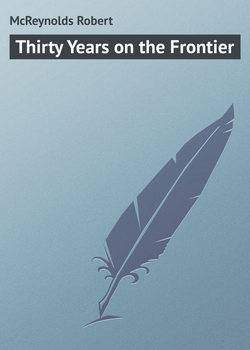Читать книгу Thirty Years on the Frontier - McReynolds Robert - Страница 3
III
BLACK HILLS DAYS
ОглавлениеI knew Doc Kinnie was not a civil engineer, but he had a plan which looked good, and as I was almost broke, I consented to help him work it. There was a horseshoe bend in the creek which might be drained for placer mining by tunneling through in a narrow place. I talked up the project with some of the boys, and they agreed to dig the tunnel while Doc did the civil engineering. Day after day they dug and blasted rock, while Doc stood around looking wise and encouraging the work. In about a month they were practically through to the other side of the creek. Then they began to call for Doc’s measurements and calculations. “Never mind, you are not through yet,” he would say, “I will let you know when to stop digging.”
“But we can hear the water rushing,” they would say.
“You fellows can’t tell anything about it. Sounds of rushing water are always carried a long distance by rocks.”
“But we are not in the rocks now, we are in a clay bank.”
“Clay does the same thing; keep on digging.”
Two days later and there was a commotion at the lower end of the tunnel, when a full head of water came rushing out, bearing with it men, wheelbarrows and shovels. They were nearly drowned, and half frozen, when they scrambled out of the creek. Mad as hornets, they sought their civil engineer, but he was nowhere to be found. The work was done. The prospects were good. When their clothes were dried and they had eaten dinner, they laughed over the incident and pardoned Doc’s miscalculation. With pan and rocker, we now began to work the dry horseshoe bend. Nuggets weighing an ounce, and from that on down to the size of a pin head, were found. The fellows were honest, and made an even divide all around at the cleanup each night. In two months we had taken out over $6,000, and then sold the claim to a placer mining company for $18,000 in cash – $3,000 apiece for the six of us. In two months we were all broke; the money had gone into wildcat speculation in mines. But who cared? Were the hills not full of gold, and all to be had for the digging?
I joined a party who went thirty miles to the northwest in search of new diggings, and the most that came of it was a laughable incident.
The great hills rose on every side, frowning darkly in the dense forest of pine. Our voices echoed from rock to rock, as we sat one noon-day about our camp-fire, talking of possible finds, when, bareheaded, with hair disheveled, blood flowing from a wound in his face, and a wildcat held to his chest in close embrace, Mark Witherspoon rushed into camp, yelling at the top of his voice. He was prospecting in a ravine a mile distant, when he saw something waving in the underbrush. Thinking it was mountain grouse, he advanced in hope of getting a shot, when a huge wildcat sprang at his throat.
As the forepaws of the animal struck his chest, he let fall his gun, and hugged the beast with all his strength to his chest with both arms. The head of the wildcat was drawn slightly backward by the tense pressure of his arms upon its back, while the claws were rendered practically powerless by the close embrace. So quick had been Witherspoon’s action at the start, that he received only a slight wound on the face. In this predicament, he started on a run for the camp. He did not dare to let go and the wildcat wouldn’t, so both held fast. The cat glared up fiercely at him with its yellow eyes, while its hot breath came into his face at every leap. Whenever the vicious beast made the slightest struggle, Witherspoon hugged the tighter, fearing at every step he might stumble and the deadly teeth be fixed in his throat.
In this manner he reached camp, and it was some seconds before he could make us understand that the cat was terribly alive, and that he was not holding it because he wanted to, or racing for the sake of the exercise. Finally one of the men despatched the animal with his revolver, and, to Witherspoon’s inexpressible relief, the dead beast dropped from his arms. Before the boys got through telling the story afterwards, they made it out that Witherspoon had run nine miles with the wildcat.
Soon after our return to Deadwood, a man in an almost fainting condition came into town and announced that his companion had either been killed or captured by the Indians. A party was organized and was led by Wild Bill. It was not long before we came upon a scene that told what the poor fellow’s fate had been, much plainer than words are able to portray. We found his blackened trunk fastened to a tree with rawhide thongs, while all around were evidences of the great torture which had been inflicted ere the fagots had been lighted.
When brought face to face with this, I stowed two cartridges safely away in my vest pocket, resolved to suicide rather than to fall into the hands of such miscreants. Then came the news of the Custer massacre. For many days afterward we patrolled the mountain tops, and kept bivouac fires lighted by night, as signals.
